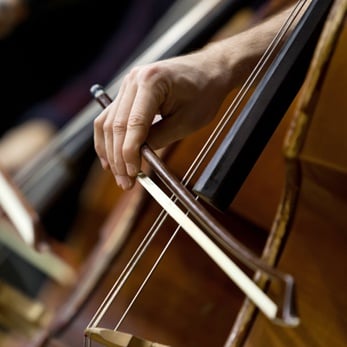The Benefits of Learning to Play a String Instrument

In recent years, researchers in a variety of medical fields have examined the influence that music training has on cognitive functions and overall health. In fact, the growing consensus concerning the benefits music education imparts to students—building stronger comprehension, math, and problems solving skills—has effected public school curriculum standards. Schools all over the country are placing new emphasis on teaching children the basic elements of music as part of the core subjects because of the measurable gains it generates in test scores and overall grade improvements. However, beginner violin students should know that learning to play a string instrument improves other areas as well.
In addition to scholastic gains, learning violin develops a number of personal skills and advantages that contribute to success. If you’ve recently decided to learn to play a string instrument, you’ve made a choice that will benefit you for the rest of your life. Learning to play a string instrument enriches your physical and mental well-being. These areas are positively impacted by music training:
Scholastic Performance
As mentioned, studies have shown clear connections between music education and classroom performance. In a reprint from the book Music and Learning by Chris Brewer, he advocates incorporating music into the classroom, explaining that music aids the learning process because it helps:
- establish a positive learning state
- create a desired atmosphere
- build a sense of anticipation
- change brain wave states
- focus concentration
- increase attention
- improve memory
- facilitate a multisensory learning experience
- release tension
- enhance imagination
Moreover, a recent article in Psychology Today, reported on the findings of several studies. Harvard Medical School Dr. Gottfried Schlaug, PhD, is an expert on music, neuroimaging and brain plasticity. In a statement at a Neuroscience 2013 conference in San Diego, he outlined the new research, explaining that enhanced sensory connections translate into improved comprehension, language, and brain functions. The simple fact that you must engage your physical, mental, and auditory abilities when you’re learning violin stimulates increased cognitive activity.
Social Interaction
Music training also improves your social skills. Even if you are learning to play using a personal instructor or an online course, performing music involves timing, and many different parts working together to create the whole. Beginning violin students who participate in classroom settings absorb these principles almost unconsciously, but every music student incorporates them because they form the foundation of a music education.
Although the violin, and other string instruments sound phenomenal when played solo, the music created by an orchestra, group, or ensemble features a depth of artistry that is impossible to describe. Plus, because it’s so fun to play with other students, learning violin creates plenty of opportunities to enlarge your social circle. As you meet other violinists and musicians who share your passion for music, practice sessions, amateur performances, and other activities will naturally become the result.
Emotional and Mental Well-Being
Many studies have also been conducted about the specific effects of music on your emotions. In particular, how certain types of music effect your mood. However, the majority of beginner violin students choose this string instrument because of personal preference. The ability to play music and create sounds that are pleasing to your specific tastes provides a wonderful outlet for personal expression.
Aside from the way music can alter your mood, having a convenient way to process your thoughts and feelings is an important part of maintaining your own personal well-being. It’s like having your own unique life hack that helps you work through difficult or confusing issues, or having an effective way to create an almost tangible expression of your joy or happiness.
In addition, new research is being conducted concerning the impact music has on memory recovery and retention. A study reported in the Oxford Journal explored music effects on stroke patients, found that “regular self-directed music listening during the early post-stroke stage can enhance cognitive recovery and prevent negative mood.”
Professional Goals
String instrument training also builds a variety of very crucial workplace skills. Beginner violin students who ‘stay the course’ have a leg up on college applications and future job interviews. Approval boards and potential employers look for team players, and learning violin teaches you exactly how to function successfully in a group, either large or small. Plus, the extracurricular activities that surround a music education provide ample opportunities for you to enrich your college applications. Even if you don’t plan on pursuing a career as a professional musician, the skills you develop through years of practice show your ability to concentrate, adapt swiftly to changes, and maintain self-discipline.
Learning violin or another string instrument builds the life skills you need to succeed. Beginning with improved metal capacity, the host of advantages you gain from music training will lay a firm foundation for your future endeavors


